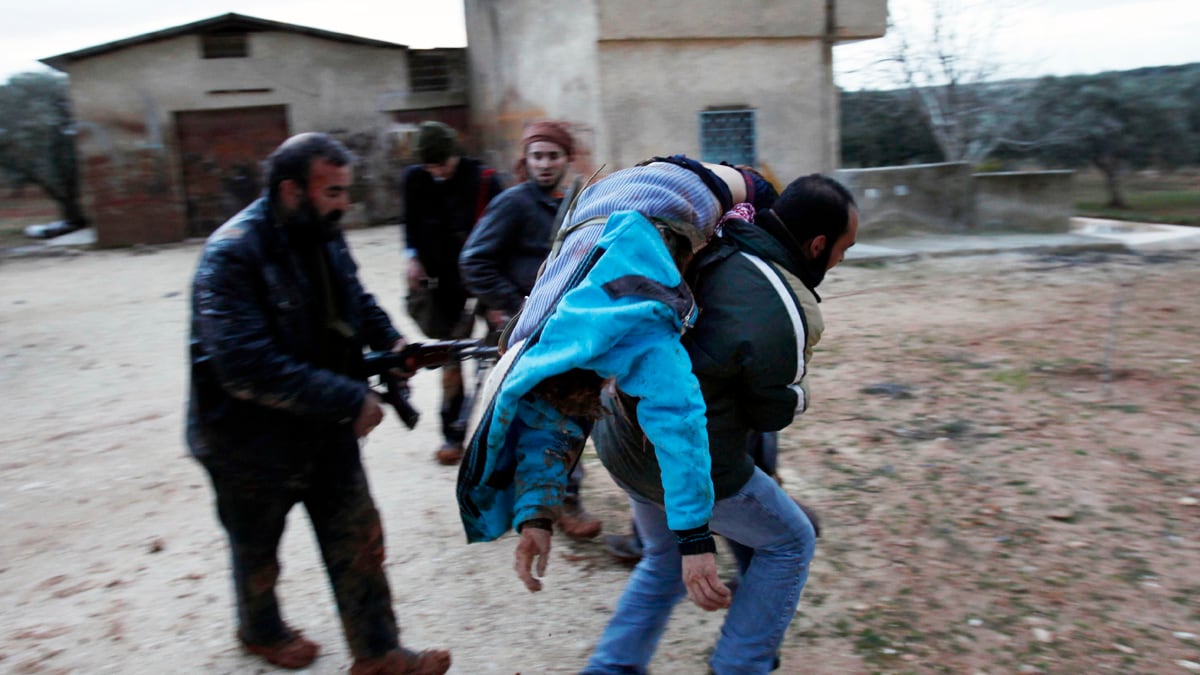Danny Abdul Dayem, a British activist whose family is from Syria, showed a videographer around a makeshift clinic in Homs earlier this week. In the video, he is unshaven and scruffy, wearing a dark, padded jacket, and his voice is thick with emotion. “Look,” he says, gesturing toward several men who are lying on the ground. “These are all dead bodies.”
“Come here,” he says, leading the videographer into another room, where a man was being treated for his injuries. “We are not animals. We are human beings,” Dayem says frantically to the person holding the video camera. “They’re going to kill us all. Please someone help us.”
It is a wrenching moment, and American officials say they want to help people like Dayem. Privately, these officials say there is no difference between the situation in Libya, where President Barack Obama authorized air strikes, and the one in Syria, at least in terms of the human-rights calculus. In both cases, as Georgetown University’s Daniel L. Byman, says, “You have a despotic regime that’s slaughtering its own people.”
More than 5,400 have died in the uprisings in Syria since last year, according to U.N. officials, who gave up tallying the number of dead several weeks ago because it was too hard to count the bodies. People around the world are clamoring for the overthrow of President Bashar al-Assad or for some type of intervention, particularly now that Russian and Chinese officials have blocked efforts at the U.N. to stop the bloodshed.
For some, Libya is a shining example of U.S. intervention, but still does not support the argument for the same kind of operation in Syria. Americans helped save the citizens of Benghazi last year, and since then “we’ve moved from a despotic regime in Libya to a much more open society,” says Michael H. Posner, assistant secretary of state for democracy, human rights, and labor, in a recent interview. But almost no one in Washington, aside from The New Republic’s Leon Wieseltier, supports a military intervention in Syria on the scale of the Libya operation.

In Syria, American officials agree, the cost is too high—militarily, politically, and economically—for the U.S. to make such an investment. Yet, as Joshua Landis, a professor of Middle East studies at University of Oklahoma, points out, the officials who claim that the U.S. is not involved sound disingenuous. The United States has imposed economic sanctions. “Sanctions are a form of warfare,” he adds. “Syrians will begin to starve soon.”
Still, Landis, as well as U.S. military officials, believes that a U.S.-backed military operation is highly unlikely. “Syrian forces go in with their ground forces and cordon off neighborhoods and arrest people and shoot them,” says an official who recently returned from Damascus but was not authorized to speak with a journalist. “You can’t defeat an arrest campaign with F-16’s. You’d have to go in on the ground. Do we have the funding-slash-political will to do this?”
Not for the deployment of troops, but many Americans believe something should be done. A group of U.S. senators is calling for the U.S. to provide “substantial material and technical support” to the Syrian opposition, as Foreign Policy’s Josh Rogin reports, and U.S. efforts may be ratcheted up, possibly with arms supplied to the rebels.
White House officials, unsurprisingly, refuse to speak on the record about supplying the rebels with arms, or about much of anything, really, when it comes to Syria. Yet some regional experts believe that is why Turkey’s foreign minister, Ahmet Davutoglu, has come to Washington this week. He is planning to meet with Secretary of State Hillary Rodham Clinton on Monday.
Most U.S. officials and regional experts believe the Assad regime is “doomed,” as University of Oklahoma’s Joshua Landis puts it, though it seems clear that many more people will die before the regime falls. Americans could send in Special Forces, as Landis says, or help create no-fly zones or humanitarian corridors, “which are fancy ways of saying, taking Syrian territory and protecting the rebel army.”
These steps, along with providing weapons to the Syrian opposition, could help reduce the bloodshed, though they could also make things worse. Americans have a tradition both of agonizing over what they are doing, or not doing, to help people who are oppressed by despotic regimes, and those who support intervention, whether in Iraq, Libya, or Syria, are often highly principled—though they can never be sure of the outcome.
“In an admirable way, the people who have the strongest sense of morality are always more haunted than those who don’t have that,” says Georgetown University’s Byman, who is the author of a 2000 book called Confronting Iraq. Besides a penchant for harboring guilt, Americans are known for managing these interventions poorly—which some would argue was the case with Iraq.
Still, “people are getting massacred” in Syria, says University of Oklahoma’s Landis, adding, “It’s not easy to stand by as you hear the appeals for American help.” Moreover, as he says, U.S. officials are “committed to the overthrow of Assad, and if you’re not going to do it yourself, you’ll have to give the arms to the opposition.” He believes Americans will inevitably become more involved in Syria because they, understandably, hope to control the outcome of the uprising. Unfortunately, as he points out, “We have a miserable track record ofcontrolling outcomes in the Middle East.”
Activist Danny Abdul Dayem, at least, is not ambivalent about the situation in Syria and has no moral qualms about what Americans should do. “If you don’t help us, they’ll kill millions, and no one will find out about us. Please someone help us,” he says in the video. “This is February the 6th.” Then the film breaks off.






